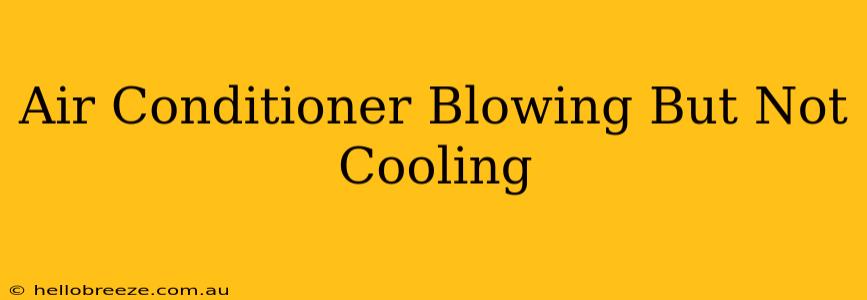Is your air conditioner blowing air, but that air isn't cool? This frustrating problem can leave you sweltering in the heat. Don't panic! This guide will walk you through the most common causes and how to troubleshoot them. We'll cover everything from simple fixes you can do yourself to when you should call a professional HVAC technician.
Why is My AC Blowing Air But Not Cold Air?
Several factors can cause your AC unit to blow warm air instead of cool air. Let's dive into the most likely culprits:
1. Refrigerant Leaks: A Common Culprit
The most common reason for an AC unit blowing warm air is a refrigerant leak. Refrigerant is the chemical that absorbs heat and cools your home. If there's a leak, the system can't effectively cool the air. This is a job for a professional. You shouldn't attempt to repair a refrigerant leak yourself as it requires specialized tools and knowledge. A low refrigerant level will often trigger a "low refrigerant" error code on your thermostat, so check your manual.
2. Dirty Air Filter: A Simple Fix
A clogged air filter restricts airflow, reducing the efficiency of your AC unit. This can lead to warm air blowing from your vents. This is an easy fix! Check your air filter and replace it if it's dirty. A clean air filter is crucial for optimal performance and extends the lifespan of your AC unit. Consult your owner's manual for filter replacement instructions; typically, you should replace or clean your filter every 1-3 months, depending on usage and environment.
3. Frozen Evaporator Coil: Ice, Ice, Baby (Not Good!)
A frozen evaporator coil is another common issue. This often occurs due to a dirty air filter (see above!), restricted airflow, or a low refrigerant level. The ice restricts airflow and prevents the unit from cooling effectively. Allow the ice to melt naturally before attempting to resolve other issues. Once melted, check for the problems listed above – dirty filter, restricted airflow, and refrigerant issues.
4. Faulty Blower Motor: A Mechanical Problem
The blower motor circulates air through the system. If it's malfunctioning, it might not be blowing enough air, resulting in warm air output. This requires professional diagnosis and likely repair or replacement.
5. Capacitor Issues: Electrical Malfunction
The capacitor provides the power surge needed for the compressor and fan motor to start. A faulty capacitor can prevent your system from running correctly. Again, professional repair is usually necessary to resolve capacitor problems.
6. Compressor Trouble: The Heart of the Problem
The compressor is the heart of your AC system. If it fails, the system won't cool properly. Compressor issues are serious and require immediate professional attention.
7. Thermostat Problems: Simple Check
A faulty thermostat can prevent your AC unit from turning on or functioning correctly. Try replacing the batteries in your thermostat. If the problem persists, it might need replacement.
When to Call an AC Repair Professional
For problems involving refrigerant leaks, compressor issues, blower motor problems, and capacitor failure, it's crucial to call a qualified HVAC technician. Attempting to repair these issues yourself can be dangerous and could further damage your AC system.
Preventative Maintenance: Keeping Your AC Cool
Regular maintenance can prevent many of these problems. This includes changing your air filter regularly, cleaning your condenser coils, and scheduling an annual professional inspection.
By following these troubleshooting steps and knowing when to seek professional help, you can keep your home cool and comfortable all summer long!

